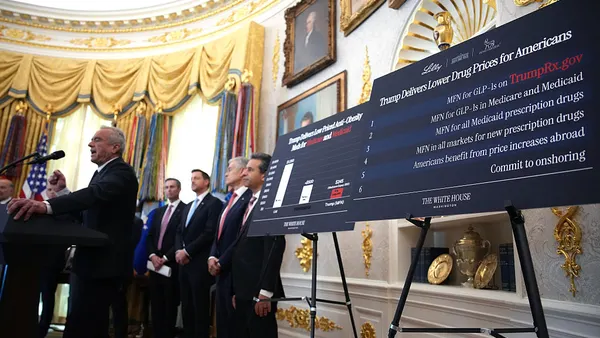When it comes to making drugs safer, cheaper, and more effective, few fields have shown more promise than molecular diagnostics. But the full potential of this revolutionary area of medical research has yet to be reached, not because of technological barriers — although they do exist — but because of serious flaws in how molecular diagnostics research is paid for and regulated. Personalizing the Treatment Molecular diagnostics is a way of making disease treatment more personalized. By performing a series of genetic tests on each of their patients, physicians are better able to achieve the “four rights" of good treatment: the right medicine for the right patient, in the right dose, at the right time. As a result, patients receive more effective treatment and avoid the wasted time and money that often result from less precise diagnoses. A good example is the widely used anticoagulant warfarin. Although it is prescribed more than 2 million times a year for conditions such as blood clots, heart attacks, and strokes, patients can display markedly different responses to the drug. The appropriate dose varies enormously between individuals. Getting the dose right is critical, as patients who receive too high a dose are at risk of severe bleeding, and those who receive too low a dose may remain at risk for life-threatening blood clots. Fortunately the FDA includes specific molecular diagnostics on warfarin’s label to prevent adverse reactions to the drug. In the United States alone, this measure likely prevents 85,000 serious bleeding events and 17,000 strokes annually and saves $1.1 billion in reduced medical costs. Overcoming Resistance Unfortunately, molecular diagnostics is being met with resistance, especially by medical insurance companies. Given the relatively high up-front cost of molecular diagnostic tests, many insurers are reluctant to offer reimbursement. When we consider the billions of dollars that will be saved by using molecular diagnostics, this up-front cost is more than justifiable. For instance, studies have shown that a molecular diagnostic test for breast cancer known as HER2 delivers a savings that is 65 times greater than its cost. The other main obstacle standing in the way of molecular diagnostics is out-of-touch regulations. The FDA approved the molecular diagnostic for warfarin based on a broad range of published literature together with the results of a study, conducted by the manufacturer, using hundreds of DNA samples. But guidance on how to navigate the diagnostic approval process is vague. To reinforce the agency’s commitment to personalized medicine, the FDA should clarify its diagnostic tool review process. In fact, this move should be a top priority of the agency’s Critical Path Initiative, the agency’s campaign aimed at modernizing and streamlining the agency. Moving Forward Unless and until the reimbursement and regulatory issues are addressed, investment in molecular diagnostic development will languish, patients will needlessly suffer, and our healthcare system will continue to be burdened by unnecessary costs. If the public clarion is for safer drugs, then the way forward shouldn’t center on fleecing pharmaceutical companies and undermining the FDA’s regulatory authority. The goal instead should be the institutionalization of molecular diagnostics. Peter J. Pitts is President of the Center for Medicine in the Public Interest (CMPI) and a former FDA Associate Commissioner. CMPI is a nonprofit, nonpartisan organization promoting innovative solutions that advance medical progress, reduce health disparities, extend life, and make healthcare more affordable, preventive, and patient-centered. For more information, visit cmpi.org. F PharmaVOICE welcomes comments about this article. E-mail us at [email protected]. CMPI Survey Shows Overwhelming Support for FDA’s Critical Path Initiative A survey conducted in January 2008 by CMPI shows that Americans overwhelmingly support the FDA’s Critical Path Initiative. The survey was comprised of a nationally representative sample of 1,049 adults and was conducted by Opinion Research Corp. It was commissioned by the Center for Medicine in the Public Interest and iGuard Inc. When asked about Critical Path, nine in 10 Americans expressed support. The Critical Path Initiative was launched by the FDA in 2004 to streamline drug development. “Day in and day out, congressional lawmakers bash the FDA," says Robert Goldberg, Ph.D., VP of the CMPI and co-author of the survey. “That may score political points, but the public’s support for this program should send a strong message to Congress: Don’t cut funding from the Critical Path Initiative." The survey also examined attitudes regarding key features of Critical Path. When asked about the FDA’s efforts to expand the use of biomarkers to identify which drugs are best for individual patients, 78% of those surveyed were supportive. The survey also found that 77% of the public supports partnerships between private companies, the FDA, and academics to create new approaches to drug evaluation and development. And almost 80% want their member of Congress to support Critical Path. “This survey demonstrates that the American public recognizes the importance of the Critical Path Initiative," says Peter Pitts, president of the CMPI and co-author of the survey. Survey respondents also expressed support for a voluntary, confidential, online portal where patients could share information about their reactions to different drug:; 87% said such a program would boost their confidence in drug safety, and 50% said they would take part. molecular diagnostics the drug safety tools of the future
An article from










